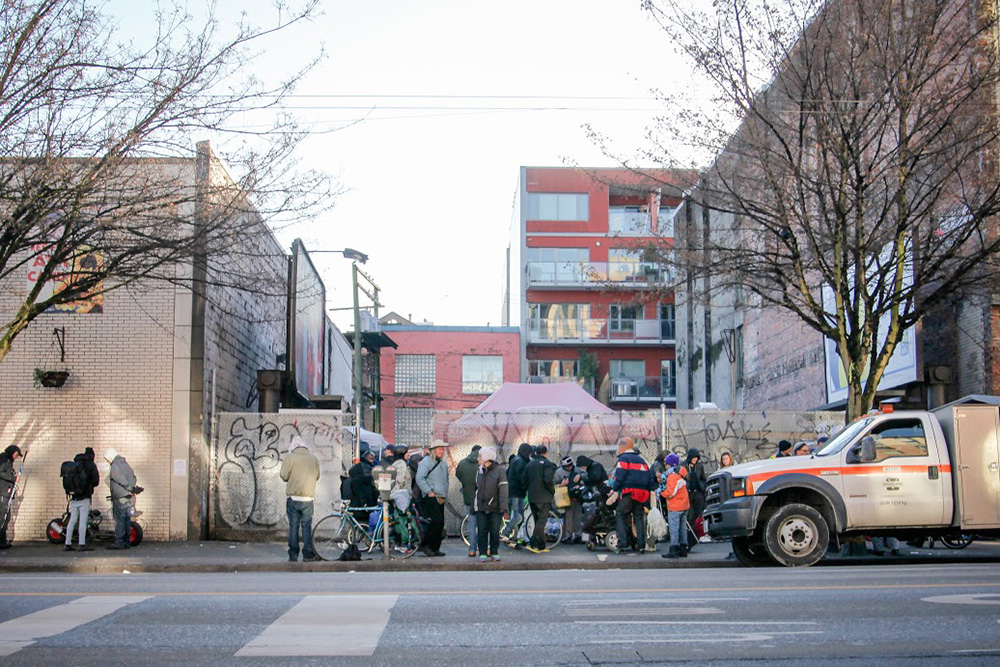A disproportionate number of homeless people, as well as sex workers and drug users, are being unjustly denied access to certain city blocks concentrated in the Downtown Eastside, charges an as-yet-to-be released study.
Courts place a variety of conditions on people released after having been charged with a criminal offence but not yet found guilty. In 20 per cent of cases those conditions include areas where the released person isn’t allowed to go — so-called “red zones.”
Often, these simply lead to additional charges when the released individuals gravitate back to familiar streets, according to the study from a team of researchers at the University of Ottawa, Simon Fraser University, the BC Centre for Excellence in HIV/AIDS and the University of Montreal.
The study examined how bail and sentencing conditions are impacting lives in four cities in Canada. It came to light when it was discussed by some researchers involved at a Feb. 15 public forum on policing in the Downtown Eastside.
According to the BC Centre for Excellence in HIV/AIDS’ Will Damon, there are more legally innocent people locked up awaiting trial in remand or preventative detention in B.C. today, than there are people serving time because they’ve been found guilty of a crime.
“When you look across Canada, the rates of criminal charges have been declining,” Damon said, “but the category [of charges] including breaches of court orders is an exception to that trend. That’s pretty astounding. A large percentage of the business in courts is concerned with people allegedly violating their bail and probation orders.”
A police officer, justice of the peace, or judge can impose conditions of release after an arrest, or at bail. A judge can also impose them after a trial or a guilty plea as terms of a probation or a conditional sentence order. Red zones, also known as “no-go areas” can be a block, a specific address, or a several block radius, which a person is forbidden to enter.
The conditions fall under an area of the law known as “administrative justice” — more or less the law of fair process. But they still have to be obeyed, and breaking them can lead to charges. In British Columbia, 40 per cent of all criminal cases include at least one administrative justice offence, according to Damon. In 79 per cent it is the most serious offence.
Researchers who reviewed nearly 95,000 cases handled in Vancouver Provincial Court or the Downtown Community Court between 2005 to 2012, found more than 528,000 conditions attached to more than 100,000 orders. One in five — 20 per cent — were no-go or red-zone conditions.
According to a fact sheet on the study distributed at the policing forum event, six unnamed individual “legal actors” the researchers interviewed defended release conditions as a “useful regulatory tool that reduces crime, particularly in ‘hot spots’ tied to the drug supply, promotes rehabilitation and the ‘public interest.’”
The anonymous individuals, described as being involved in imposing or negotiating conditions of release, called red-zone conditions generally reasonable, based on what police request for any specific individual accused. The same “legal actors” conceded however that they could not explain why so many of those conditions end up in breaches.
The conditions have dramatic consequences for the lives of marginalized people, says Marie-Eve Sylvestre, who also participated in the research from the University of Ottawa’s Faculty of Law. Restrictions on a person’s access to public spaces can impede their ability to find health services, shelter or even just familiar faces, if they fall within the no-go area.
“Whenever someone is red-zoned,” Sylvestre said, “their security, and sometimes their life, are threatened.”
The researchers discovered that “red zones were often broader or much wider for marginalized groups,” than for individuals charged with more violent crimes. Moreover, such people often didn’t understand the details of an area condition, partly because it can be vaguely outlined with no timeframe.
Despite a decrease in B.C. incarceration rates — now the lowest in the country — the study found that there has been a simultaneous increase in conditional release to community supervision, particularly in the Downtown Eastside.
The conditions can quickly result in that release being revoked, however, or additional “administrative justice” charges being laid against someone who breaches them.
Doug King, a lawyer with Pivot Legal Society, told the same policing forum that city police officers use observations of bylaw infractions — like jaywalking or street solicitation — to obtain someone’s identification. Then they check to see if that person is breaching an order. If the individual is found to be violating a red-zone order, that’s enough legal justification to search them, even absent of other reasonable and probable grounds to do so.
Unusually for Vancouver, 45 per cent of all calls to police in the Downtown Eastside are from other officers, mostly for information about outstanding warrants, arrests or court orders relating to some individual. In 2013, the researchers say, police in the 10-block neighbourhood also issued 76 per cent of all the tickets written for jaywalking in the whole city, as well as 95 per cent of those for street solicitation.
The following year, failures to comply with release conditions and breaches of probation orders represented 79 per cent of all police-reported administrative offences. The researchers underscored how these smaller breaches occupy a large amount of police, judicial and correctional resources.
While researchers say the restrictions may violate rights to presumption of innocence, mobility, reasonable bail, and even life, security and integrity, they’re seldom challenged in court.
“There are multiple obstacles to formulating rights claims,” in court, the researchers’ fact sheet observed. “Chief among which is the power imbalance that individuals have to negotiate from remand centres, and the ritualized, bureaucratic, and almost banal nature of the criminal justice process.”
The Vancouver Police Department was unable to respond to an interview request by deadline. ![]()
Read more: Rights + Justice, Politics
















Tyee Commenting Guidelines
Comments that violate guidelines risk being deleted, and violations may result in a temporary or permanent user ban. Maintain the spirit of good conversation to stay in the discussion.
*Please note The Tyee is not a forum for spreading misinformation about COVID-19, denying its existence or minimizing its risk to public health.
Do:
Do not: